Inclusion Only When It’s Convenient
Why the Premier League’s LGBTQ+ Advocacy Is Just Empty PR
My sibling is queer. My cousin is queer. My friends are queer. My coworkers are queer. I really wish in the year 2024 we didn’t have to have this god damn conversation. Please if you are going to commit to reading this, then read the whole thing.
When Ipswich Town’s Sam Morsy refused to wear a rainbow captain’s armband this week, citing his religious beliefs, it reignited a debate that goes far beyond the football pitch. Should players be compelled to participate in campaigns that promote inclusivity for marginalized communities? Is it fair to ask athletes to set aside personal or religious convictions to support a cause they may not agree with? And perhaps most importantly: What happens to the game—and the people who love it—if inclusivity is treated as optional?
The Rainbow Laces campaign, for all its good intentions, is about more than armbands and shoelaces. It’s about signaling to LGBTQ+ fans, players, and coaches that football belongs to them too. It’s about reminding us all that the game thrives not despite our differences but because of them. Yet the backlash from some players reveals a deeper tension: how do we reconcile the individual freedoms of athletes with the collective responsibility of the sport to be inclusive?
It’s an uncomfortable question for someone in the United States who sees this parallel all too often with the increase in nazi and white-supremacy symbolism. In some cases there are no longer dog whistles for hatred, but open town cryers that have their voices amplified by social media. At what point does a tolerant society need to be intolerant of bigotry and hatred. It turns out this question has already been posed before.
In modern democracies, the idea of tolerance is considered a bedrock principle, a necessary foundation for the coexistence of diverse beliefs, identities, and ways of life. This principle, however, is not without its limits. The philosopher Karl Popper articulated the paradox of tolerance in 1945, warning that unlimited tolerance of intolerant ideologies could lead to the destruction of a tolerant society. If a society tolerates the intolerant to the point where intolerance is allowed to grow unchecked, it risks undermining its own foundations. This principle is particularly relevant now in professional sports, where athletes serve not just as competitors but as influential public figures and cultural symbols.
In the Premier League, the Rainbow Laces campaign is a way for clubs, players, and fans to stand in solidarity with LGBTQ+ communities. It’s not perfect. A rainbow-colored armband won’t end homophobia overnight, and there are still no openly gay players in the league. But it’s a start—a small but meaningful step toward making football more inclusive.
And yet, when players like Ipswich Town’s Sam Morsy or Manchester United’s Noussair Mazraoui decline to participate, it raises uncomfortable questions. What does it mean for the campaign when the very people who are supposed to represent its values choose not to? Can a campaign for inclusivity succeed if participation is optional?
Then there is Crystal Palace captain Marc Guehi, who coyly got around the rule by writing “I <3 Jesus” on his rainbow armband. When asked about it later he said ““I think the message was pretty clear to be honest. It’s a message of love and truth as well and a message of inclusivity, so it speaks for itself.”.
No Marc, I don’t think it fucking speaks for itself if you have to be asked about it later and then don’t give a straight answer.
By the way, where are the religious refusals when affiliated with betting or alcohol sponsors? Crickets.
Imagine you’re a young LGBTQ+ fan, sitting in the stands or watching from home. You see the rainbow flags in the stadium, the armbands on the captains, and for a moment, you feel seen. Then you hear about the players who refused to wear the armband. What message does that send? That your identity is a political issue? That your place in the game is still up for debate?
Football is supposed to be for everyone. So why doesn’t it always feel that way?
When Marcus Rashford took a stand against child food poverty, it wasn’t just about the meals he helped secure for millions of kids. It was about the message: that someone with his platform was willing to fight for those who couldn’t fight for themselves. The rainbow armband carries a similar weight. It’s not just a piece of fabric; it’s a statement of solidarity, a reminder that LGBTQ+ fans and players are part of the football family.
Refusing to wear the armband, whether out of religious conviction or personal discomfort, sends a message too. It says, “I don’t support this.” And while players have every right to their beliefs, those beliefs don’t exist in a vacuum. In a sport that has long struggled with homophobia, from the terraces to the dressing rooms, even a passive refusal can feel like a rejection of progress.
And for their part, the Premier League itself is not innocent in all of this. Their stance on LGBTQ+ inclusivity rings hollow when viewed in the context of its actions abroad. While the league and its clubs prominently support campaigns like Rainbow Laces in Western countries, where LGBTQ+ rights are broadly recognized, this advocacy vanishes when it is inconvenient. When clubs play matches or participate in promotional tours in countries where LGBTQ+ individuals face persecution, imprisonment, or even execution, all signs of these campaigns disappear. Rainbow armbands and pride messaging are quietly set aside to avoid upsetting regimes that maintain oppressive laws or cultures. This inconsistency exposes the league’s priorities: profit over principle.
You cannot credibly claim to stand against discrimination while courting financial opportunities in countries where LGBTQ+ individuals live in constant fear. Fighting oppression is not supposed to be convenient. It requires unwavering commitment, even when it comes at a cost. By selectively applying its support for LGBTQ+ causes, the league reduces these campaigns to mere PR exercises, designed to appease progressive audiences in safe markets while turning a blind eye to human rights abuses elsewhere. Until the Premier League is willing to uphold these values universally, its claims of inclusivity remain a shallow marketing ploy rather than a meaningful stand for equality.
Of course, some will argue that players shouldn’t have to compromise their values for a cause they don’t believe in. But what happens when those values conflict with the league’s commitment to inclusivity? Is the right to abstain more important than the responsibility to create a welcoming environment for all? And even though I believe it’s made in bad faith, I’d like to entertain the reasoning for the argument of the other side.
Critics may view LGBTQ+ identities and lifestyles as inconsistent with their personal or religious understanding of human nature or morality. For instance, certain religious teachings interpret heterosexuality and cisgender identity as divinely ordained, framing other orientations or identities as deviations from a "natural order."
From this perspective, promoting LGBTQ+ acceptance can feel like an attempt to normalize something they see as incompatible with traditional values or natural law.
The argument that inclusivity campaigns "shove ideology down people's throats" overlooks the fundamental purpose of these initiatives: creating a welcoming environment for everyone. Participation in campaigns like this does not demand ideological conformity or personal endorsement of every aspect of LGBTQ+ advocacy; it is simply a gesture of respect and solidarity with marginalized communities.
Athletes are public figures who represent not just themselves but also their teams, leagues, and the values of the sport. Just as players are expected to adhere to standards that prohibit racism or violence, they should be expected to support inclusivity campaigns that affirm the dignity of all individuals. Refusing to participate sends a message that some people’s rights and existence remain negotiable, perpetuating exclusion rather than fostering dialogue.
Tolerance is not about agreeing with everything; it’s about ensuring that everyone feels safe and valued. Supporting inclusivity campaigns is not coercion—it’s a commitment to making football the inclusive, universal game it claims to be.
This is where the paradox of tolerance comes in. Philosopher Karl Popper argued that a tolerant society cannot tolerate intolerance. If it does, intolerance will eventually erode the very foundations of that society. The same principle applies to football. If the Premier League allows players to opt out of inclusivity campaigns, it risks undermining the very progress those campaigns are designed to achieve.
Let’s be clear: this isn’t about forcing players to change their beliefs. It’s about recognizing that some beliefs—particularly those that exclude or marginalize others—can’t take precedence over the collective good. Football thrives on diversity. It’s a sport where players from literally hundreds of nationalities, cultures, and backgrounds come together to create something greater than the sum of its parts. But that unity falls apart if inclusivity becomes optional.
When players refuse to wear the armband, it’s not just a personal decision. It’s a public act with real consequences. It signals to LGBTQ+ fans and players that their acceptance is still conditional, that their place in the game is still contested. And in a sport as influential as football, that message reverberates far beyond the pitch.
At its core, this debate is about the balance between individual freedom and collective responsibility. Players like Morsy and Mazraoui have every right to their beliefs. But as representatives of their clubs and the league, they also have a responsibility to uphold the values of the sport. And inclusivity is one of those values.
Think about it this way: players are already expected to adhere to certain standards. They can’t use racist or sexist language on the pitch. They can’t promote political ideologies through their kits. These rules exist to protect the integrity of the game and ensure it’s a space where everyone feels welcome. Why should inclusivity be any different?
Critics might argue that compelling players to wear the armband infringes on their freedom of expression. But what about the freedom of LGBTQ+ fans and players to exist without fear of discrimination? Whose freedom matters more in this equation? And is it really too much to ask athletes, who enjoy immense privilege and influence, to take a stand for those who are marginalized?
This doesn’t mean punishing players who refuse to participate. It means fostering a culture where inclusion is seen as a core value, not an optional extra. It means educating players about the experiences of LGBTQ+ fans and teammates, helping them understand why these campaigns matter. And it means standing firm in the face of backlash, knowing that progress is never easy but always worth it.
Football has the power to change lives, to break down barriers, to unite people who might otherwise never cross paths. But it can only do that if it’s a space where everyone feels welcome.
True tolerance requires action, commitment, and sometimes, difficult conversations. It requires us to hold ourselves—and each other—to a higher standard.
Football has always been more than a game. It’s a reflection of who we are and who we aspire to be. And in a world that often feels divided, it has the power to bring us together. But only if we’re willing to do the work to make it truly inclusive.
So the question isn’t whether players should wear the armband. The question is: What kind of message do we want to send—to LGBTQ+ fans, to future generations, to the world? The answer, I think, is clear. It’s time for the Premier League to take a stand. Because football, at its best, is for everyone. And it always should be.



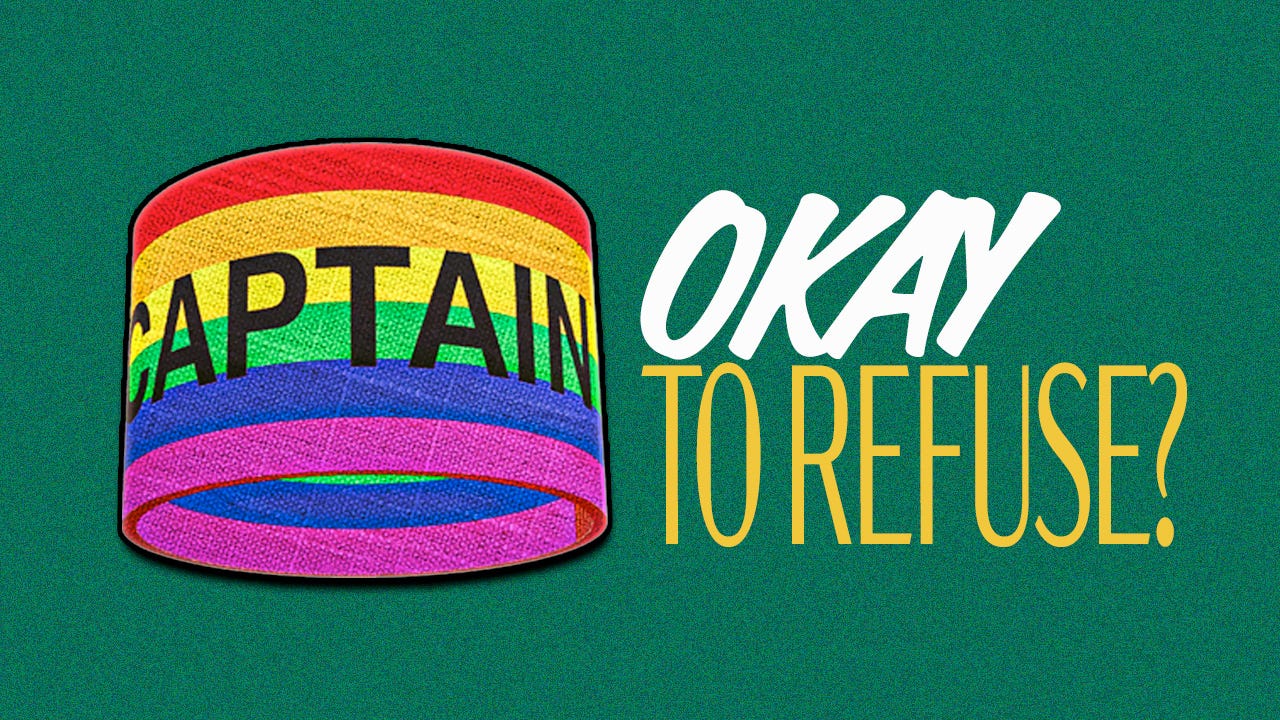
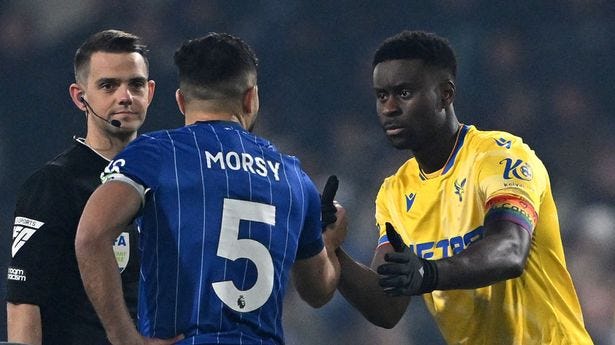
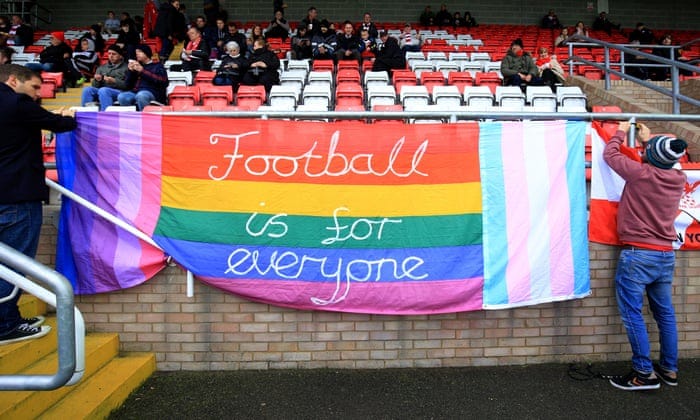
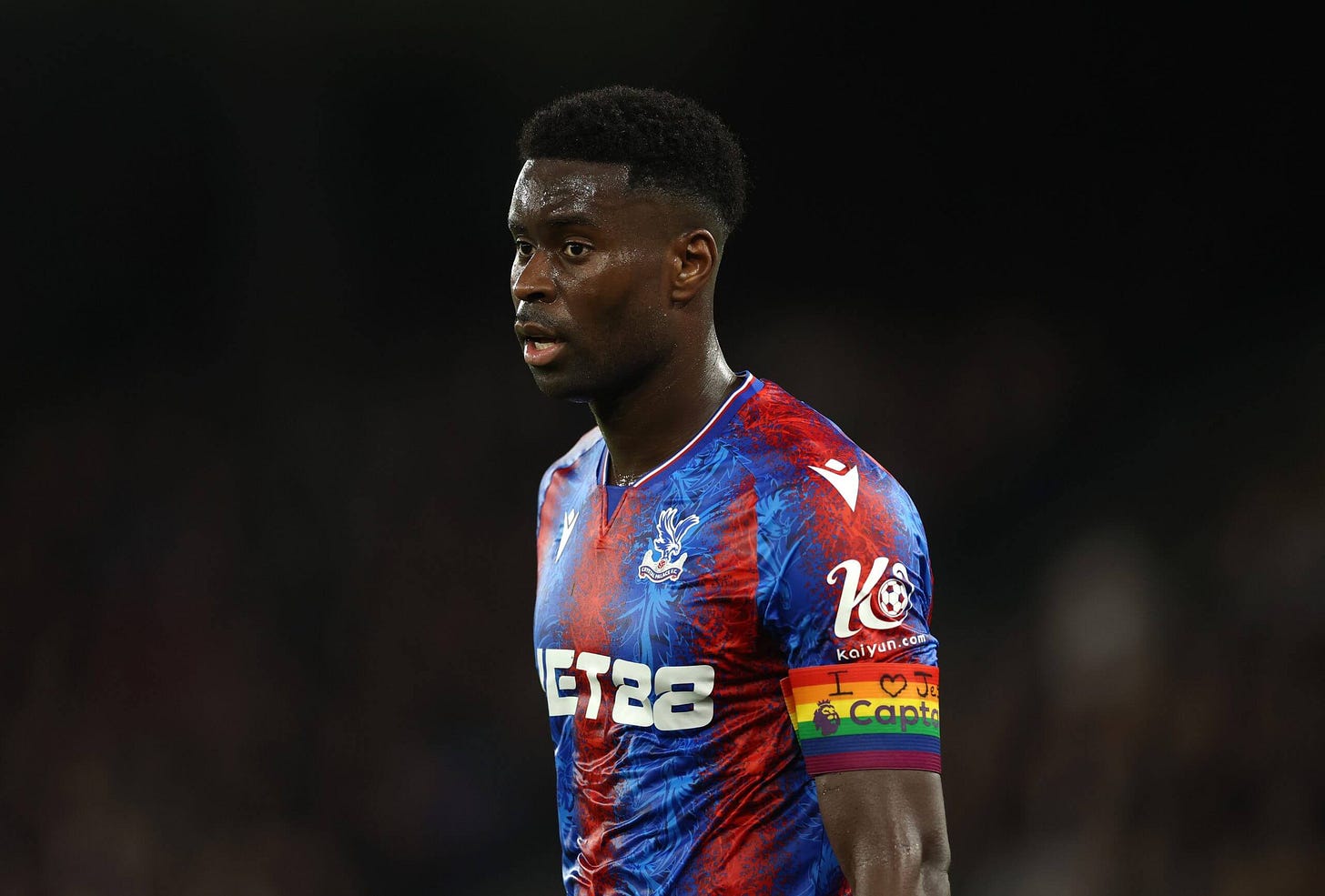
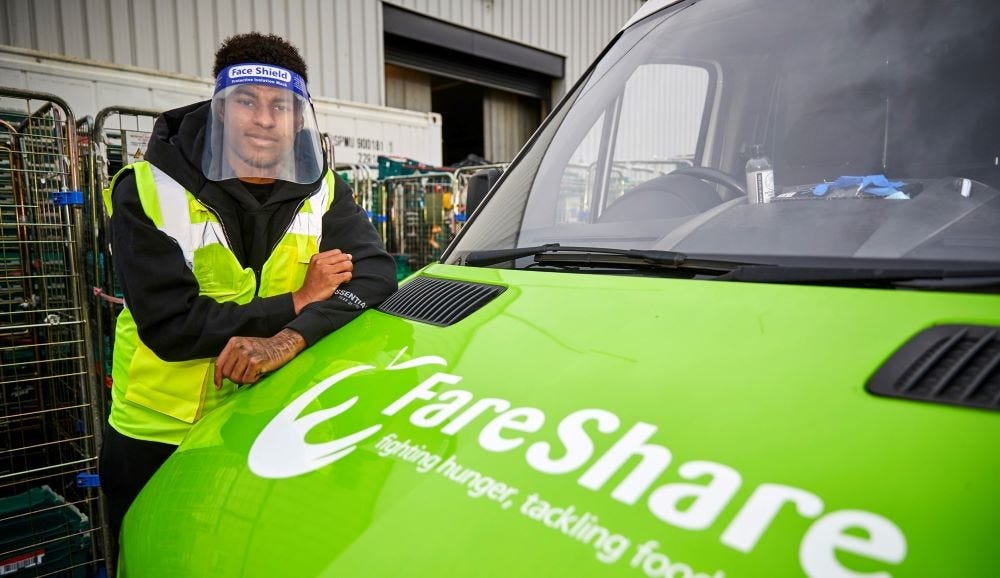
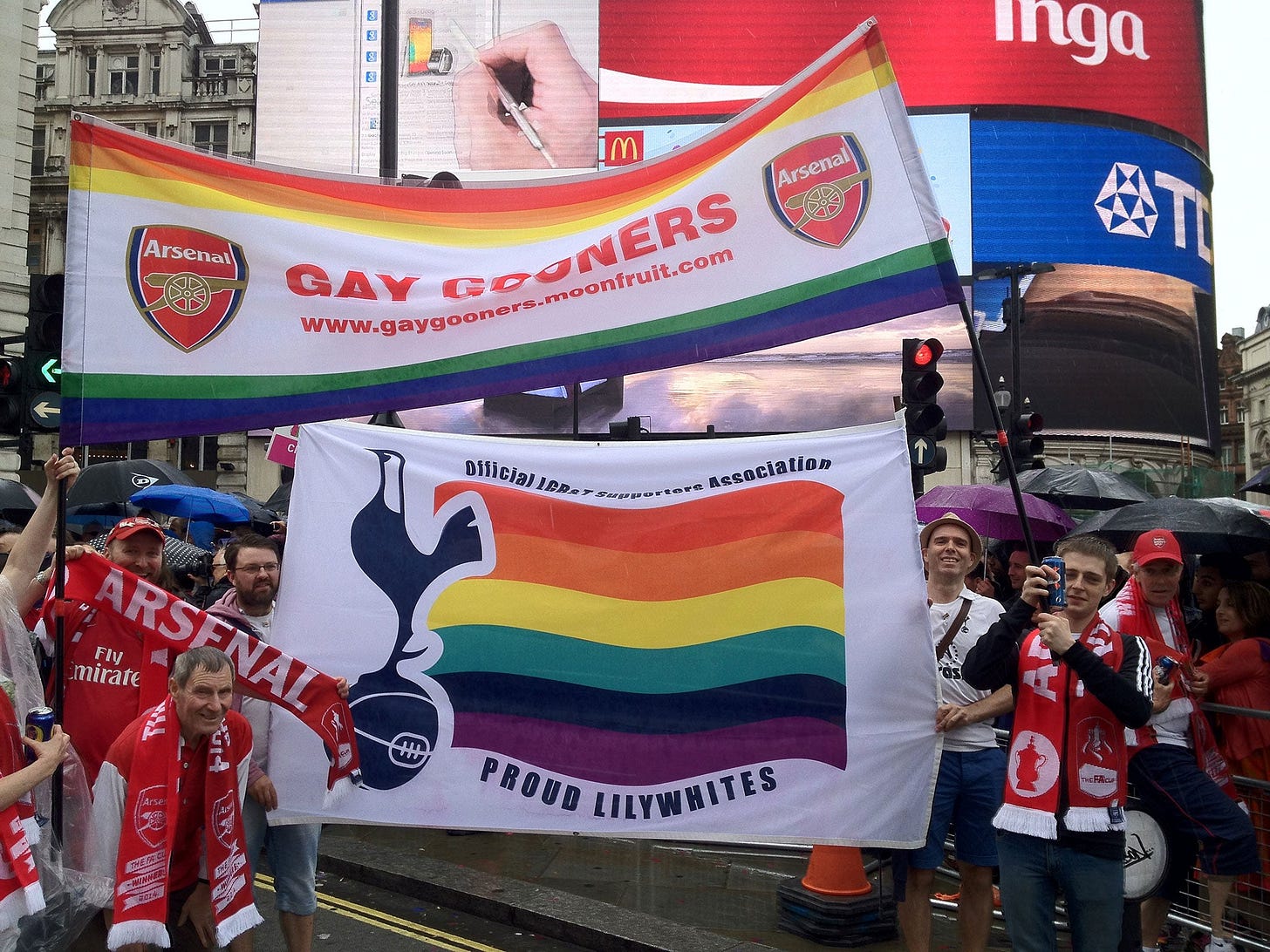
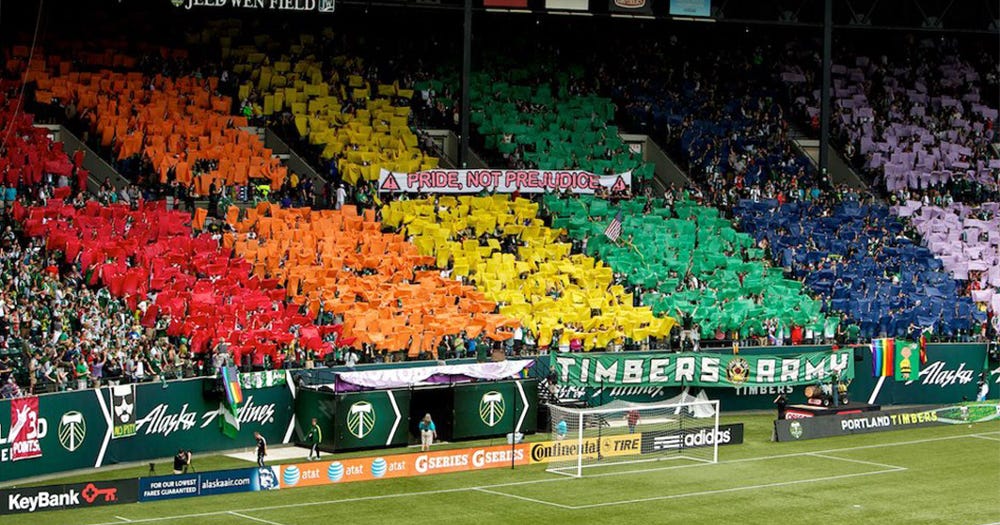
Great article, Jake. In these political times, standing up against intolerance is crucial. However, I don't think someone should wear the Captain's armband supporting lgbtq rights if they in fact oppose those rights. I'm not saying that they shouldn't have to do something with which they disagree. I'm saying that they are not welcome to have the privilege of wearing that arm band.
You are right on the corporate virtue signaling. I don’t agree on the rainbow armband. If they want to signal soccer is for everyone they could just make an arm band that says everyone welcome. The rainbow is specifically promoting a certain group. Now ask Muslim players to put a cross on their arm or Christians to put on Buddha or a crescent. That doesn’t seem so tolerant does it. Tolerance and approval are not the same thing. Forcing approval is just a cynical purity test that says everyone is welcome except people we disagree with. Society and soccer can maintain pluralism. People can coexist with each other at work and play and require no approval of their personal beliefs. They don’t ask your orientation at the ticket office or in HR and that should be enough.
Side note: The lack of openly queer players is not an indication of exclusion. Pro athletes are a very small fraction of people, as are queer people a small percentage of people. There probably aren’t many that are both and they may just be private. Their coaches and team mates may know and it is just none of our business.